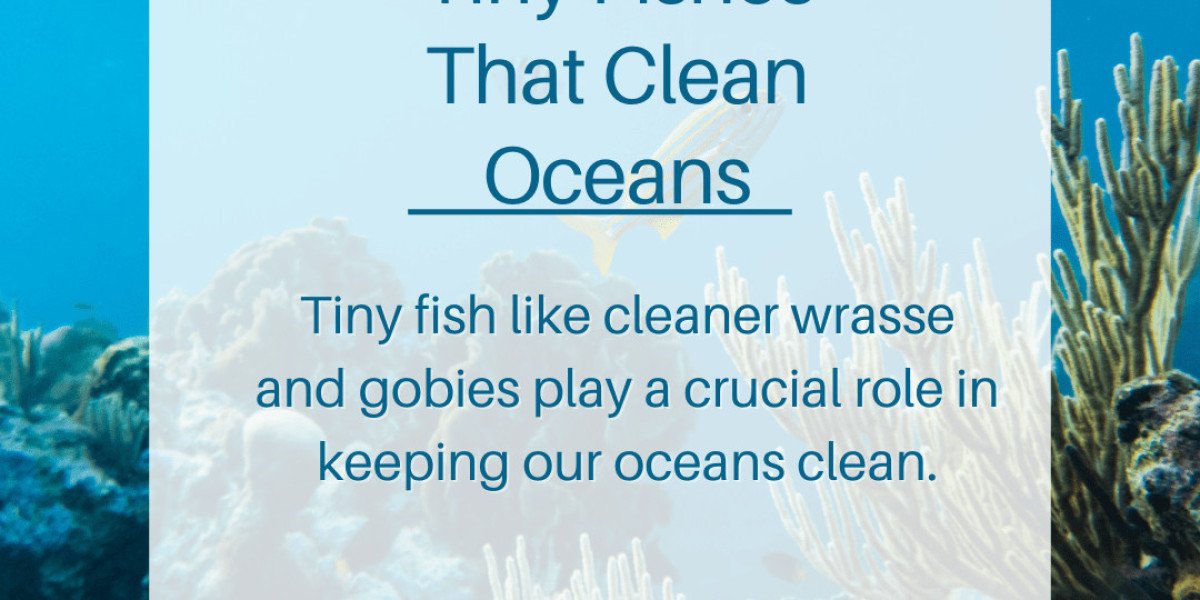Tiny Fishes That Clean Oceans
Covering more than 70% of the Earth's surface, oceans form an intrinsic part of the complex web that sustains life on this planet. Though larger marine animals may often monopolize the limelight, it is these small fishes that, being invariably invaluable and yet seldom credited, act as purifiers for the oceans. They are quite intriguing little creatures, and they act as keystone species, supporting fragile balances in their ecosystem. Whether controlling algae blooms or cleaning coral reefs, these little fishes are nature's silent heroes in the quest for a healthy ocean.
1. The Cleaning Crew: Cleaner Fish
Another well-known instance of small fishes contributing to ocean cleanliness would be the "cleaner fish." Cleaner fish like cleaner wrasse, gobies, and cleaner shrimp work alongside larger fish species in a symbiotic relationship. The small fish become the cleaners: they pick parasites, dead skin, and other detritus from their bigger clients. Thus, both parties benefit-diseases and parasites are taken away from the larger fish, while the cleaner fish get a constant supply of food. Cleaner fish are commonly found near coral reefs where they provide their important cleaning services.
The cleaner wrasse is one example of brightly colored small fish that clean larger fish in the mouths, gills, and in other open spaces. Cleaning stations are commonly found on coral reefs in tropical and subtropical oceans, and the wrasses help reduce the population of parasites that are harmful to host fishes.
2. Small But Mighty: Herbivorous Fishes
The herbivores, much smaller and fewer in number compared to others, keep the ocean clean. Therefore, the parrotfish, surgeonfish, and damselfish scrape algae off coral reefs and other surfaces in the ocean. The herbivorous fish, which crown little with logical growth, keep unchecked algae from completely smothering coral reef systems; such would mean ruin for the entire ecosystem. Thus, keeping the algae populations in check allows for coral growth, thus creating a healthy habitat for many species.
Most importantly, they help to clean the reefs. Parrotfish scrape algae off rocks and coral with their beaklike mouths, often helping to control the overgrowth of evil algae. Parrotfish also make sandy beaches by eating coral and algae, transforming it into waste that becomes part of the sand on our gorgeous shores.
3. Small Fish of Plankton Feeds as a Microorganism
Although we often think of the bigger creatures of the ocean, the smaller ones that consume plankton are also incredibly important in maintaining the health of the seas. The little fish, such as anchovies, herrings, and sardines, dine lushly on plankton, which further break down into either phytoplankton or zooplankton. It is feeding relationships like this that constitute marine food webs. The roles that these small fish play in the control of plankton populations keep nutrients in balance in that the ocean becomes functionally opposed to the overpowering ability of the plankton population with regards to harm on the surrounding environment.
Also, a great many plankton-feeders then in turn serve as food for larger predators and thus complete the marine food web process that ensures sustainability. Their contribution to nutrient recycling sustains the health of whole ocean ecosystems.
4. The Importance of Protecting These Tiny Cleaners
Despite the small fish being far from less important, their survival is continuously in danger. The destruction of coral reefs, pollution, overfishing, and climate change represent threats to the delicate balance of marine ecosystems, relevant for the survival of cleaner fish, herbivorous fish, and plankton-eating species.
The protection of these tiny fishes means the survival of the entire ecosystem. MPAs, less pollution, and sustainable fishing practices will allow these fishes to continue playing a critical role. Just as important is the restoration of coral reefs, cutting down plastics, and tackling climate change in order to protect marine species reliant upon oceans that are clean and healthy.
5. Conclusion: Tiny Fish, Big Impact
These fish may be small, but they are giant when it comes to the contribution they make towards cleaning oceans. From providing cleaning services for larger fishes to controlling algae and providing great coral reefs, they play important roles in maintaining the health of oceans. In the ongoing progress towards the protection and preservation of marine ecosystems, it becomes imperative, though not too dazzling and pompous, to discount them from our great concern. Their influence in shaping the health of oceans is never too little; it is some immense force.








